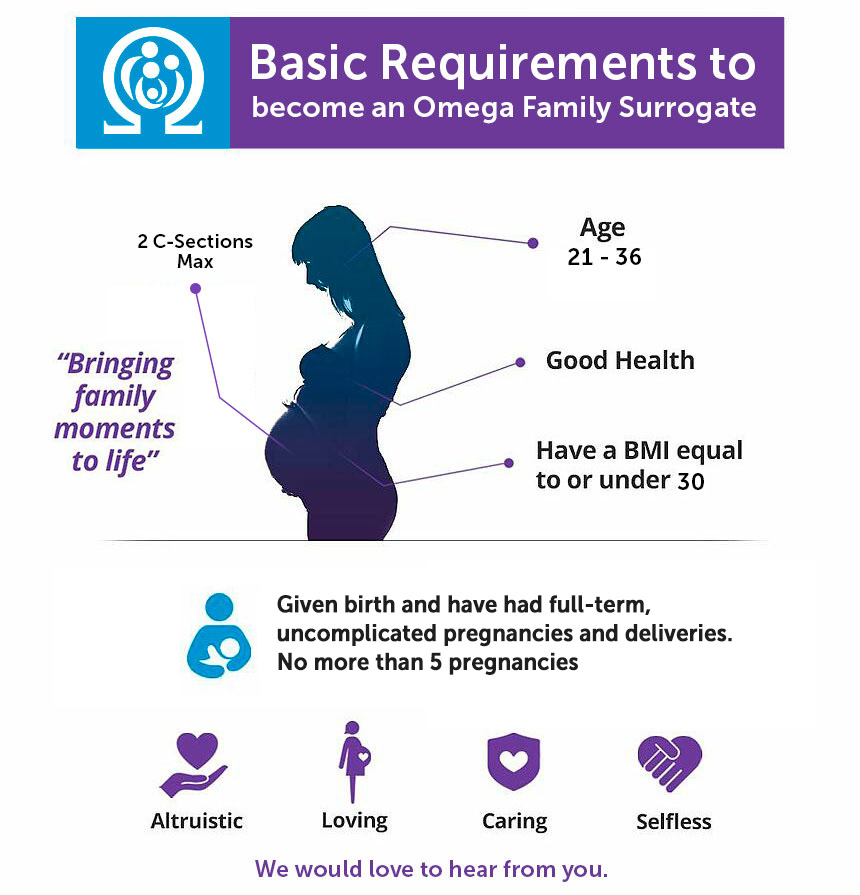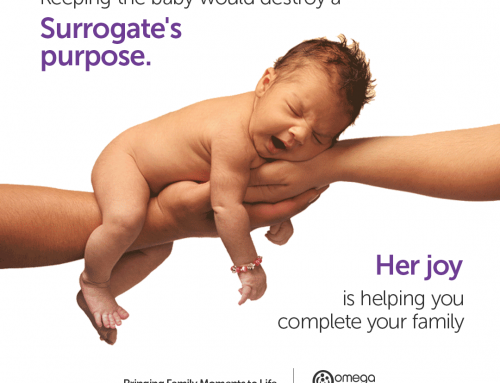INFERTILITY ON THE RISE
The number of couples facing infertility has risen across the years. The reasons for this phenomenon are currently being studied to provide a solution for those enduring infertility. In the meantime, couples are considering alternative family creation options. Surrogacy is gaining momentum; this, in turn, means that there is an increasing need for Surrogates.
To become a Surrogate, it is recommended that a woman go through an agency because the agency has experience in dealing with all the details that having a baby for someone else entails. Because of their knowledge and their close work with fertility clinics, certain requirements are set into place to ensure the safety of the baby and the Surrogate.
Omega Family Surrogates works with a variety of competent professionals in the field and has determined the qualifications a woman must have to serve as a Surrogate for Intended Parents. These requirements are there to protect the baby and the Surrogate; in no way are they there to pass judgment on a woman based on physical appearance or her capacity to have children of her own. The importance of understanding why the requirements are set into place reduces the amount of judgment that a woman may feel when not meeting these needs.
Let’s learn about some, not all, of the requirements to clarify why they do not pass judgment on a potential Surrogate.
Being a mother prior to becoming a Surrogate
OFS chooses women who have proven that they can complete an uncomplicated pregnancy and birth. Doctors know that women who carry their own children do face risks. These risks are normal, and they are taken care of in the best way possible. Women may choose to risk their health to have a child of their own, but when it comes to Surrogacy, that is not a choice they are allowed to make. If the woman has the ability to have children, it is a great place to start, but it’s just the beginning.
Medical professionals, Surrogacy Agencies, and Intended Parents make sure that that the Surrogate is fit to have child for someone else. What that means is that Surrogates are mothers themselves and they know how their body responds to a pregnancy. Since they’re choosing to have a child for someone else, they must know that they are going to be healthy throughout the pregnancy. Remember a Surrogate still must be able to take care of her own children and family, as well as the baby growing inside of her.
Body Mass Index measures the relationship between your height and your weight. Omega Family requires BMI equal to or under 30 to be able to serve as a Surrogate. Woman who are within this range have a higher success rate when it comes to becoming pregnant through Invitro fertilization, and have less risk of losing the embryo once it is implanted. This indicator by no means tells a woman that if she does not meet this requirement, she is unfit to carry children, or that she is unable to have a healthy baby.
Having a BMI within the range minimizes the development of medical complications:
- Preeclampsia or high blood pressure
- Gestational Diabetes, a condition in which the body does not process sugar well that may last the duration of the pregnancy and disappear after birth
- Stillbirth, the the risk of the baby being stillborn.
Psychological Readiness for Surrogacy
Becoming a Surrogate involves a woman willing to undergo a pregnancy for other people who cannot have children naturally. First-time Surrogates have never given the baby they just birthed to someone else. They have always kept the baby after he or she was born. It is important that the Surrogate can handle the emotional pressures of a pregnancy that produces a child placed immediately into the arms of someone else.
From the Intended Parents’ point of view, they feel blessed that someone would be willing to do this for them. They know how hard it is to have a child, and their appreciation is beyond measure. When this outcome is fully appreciated by the Surrogate, her months of involvement are understood to be a beautiful gift.
The Surrogate must also be prepared to deal with the outside world’s opinions on Surrogacy. She becomes an educator in her community on the topic. There is a lot of misinformation regarding Surrogacy and a large group of people who do not know how to react to Surrogates or what they do. A Surrogate must be prepared for that response and know how to deal with it. Omega Family Surrogates supports her by providing integrated resources such as the Surrogate Liaison Program, the Omega Stories Facebook Group, and a variety of blogs on their website that provide information about Surrogacy and about family creation options.
The Age Factor
For Omega Family Surrogates, the youngest Surrogate age is 21 and the oldest 36. According tostudies and observations, the higher the Surrogate age, the higher chances of a risk factor to appear. During the past 20 years women are choosing to postpone childbearing for a later age. If a woman who wants to have a child finds herself at the age of 35 or higher, her pregnancy is considered geriatric and she is considered at an advanced maternal age. This is also true for the Intended Mother’s embryo. If she is older than 35 risks affect the baby not only through the Surrogate but through the Intended Mother’s egg as well.
No more than 5 pregnancies or 2 cesarean sections
Some women are extremely fertile. Their pregnancies go smoothly and many of them have large families. This is a blessing, taking into consideration that there are so many couples who face infertility daily. The easiness with which they have children makes Surrogacy an appealing option because it involves doing something selfless for someone else, going through a pregnancy which is very natural to them, as well as making an income.
What is oftentimes overlooked is that Omega Family Surrogates works closely with national entities that regulate and study reproduction. These organizations have set in place certain limitations to how many pregnancies a woman should or can have before becoming a Surrogate. One of the organizations that set these guidelines is the American Society for Reproductive Medicine.
We are grateful to all women who apply with us and at no point is there passing of judgment regarding how many children she chooses to have. What the requirement aims to do is to reduce risks associated with pregnancy to help Intended Parents feel that their Surrogate will be able to have their child.
Government Assistance
There is nothing wrong with receiving government assistance. There are times if life where you need that assistance to get by. Compensated Gestational Surrogacy involves an income that could mean that you would lose the assistance that you currently receive from the government. Omega Family Surrogates does not want you to lose that assistance that you need.
There are certain types of government assistance that you can be on and still qualify as a Surrogate. This is something that is analyzed on a case-by-case basis. The important thing here is that Surrogacy is temporary, and it is not until you are confirmed pregnant that you receive monthly payments. Once the journey is done, and no more payments come in, you would have to apply for the government assistance again.
Becoming a Surrogate involves having your heart in the right place
Gestational Surrogacy does involve an income. The way Surrogates and their families choose to use or invest it is personal and private. What is not personal and private is the way that the Surrogate chooses to treat her body, how she decides to live her lifestyle, and her attitude towards the pregnancy. Through the Facebook group Omega Surrogate Stories, Omega Surrogates tell about their journeys, their relationships, and how important it is to them to have a connection with their Intended Parents. Their hearts are in the right place.
The fact that there are women who need the income and consider Surrogacy as a way to work from home is fine. There is no problem with that thought. The problem becomes when the only reason that a woman wants to be a Surrogate is to generate that income, setting aside what is in the best interest of the baby, the Intended Parents, and herself.
Surrogate Requirements Do Not Pass Judgment
The main purpose of requiring the Surrogate to comply with certain indicators is to keep her and the baby safe throughout the surrogacy pregnancy. There is no other reason than that. If by any chance you cannot become a Surrogate because you don’t meet the requirements, that does not mean that something’s wrong with you, or that you are unable to help a family who faces infertility. Surrogate requirements are not there to pass judgment; they are there to ensure the health and safety of both the Surrogate and the baby.






